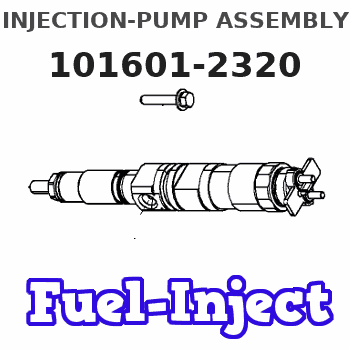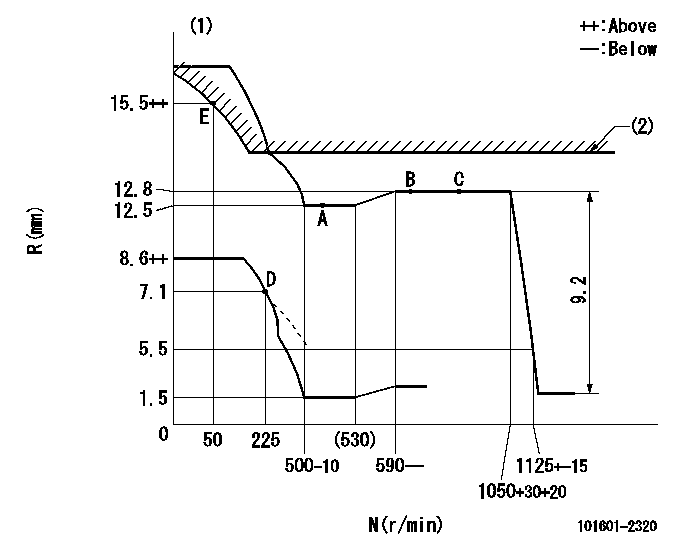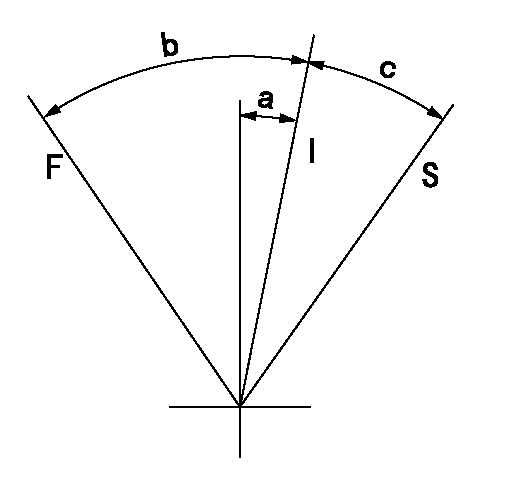Information injection-pump assembly
ZEXEL
101601-2320
1016012320
HINO
220001620B
220001620b

Rating:
Cross reference number
ZEXEL
101601-2320
1016012320
HINO
220001620B
220001620b
Zexel num
Bosch num
Firm num
Name
Calibration Data:
Adjustment conditions
Test oil
1404 Test oil ISO4113 or {SAEJ967d}
1404 Test oil ISO4113 or {SAEJ967d}
Test oil temperature
degC
40
40
45
Nozzle and nozzle holder
105780-8140
Bosch type code
EF8511/9A
Nozzle
105780-0000
Bosch type code
DN12SD12T
Nozzle holder
105780-2080
Bosch type code
EF8511/9
Opening pressure
MPa
17.2
Opening pressure
kgf/cm2
175
Injection pipe
Outer diameter - inner diameter - length (mm) mm 6-2-600
Outer diameter - inner diameter - length (mm) mm 6-2-600
Overflow valve
131424-4120
Overflow valve opening pressure
kPa
122.5
98
147
Overflow valve opening pressure
kgf/cm2
1.25
1
1.5
Tester oil delivery pressure
kPa
157
157
157
Tester oil delivery pressure
kgf/cm2
1.6
1.6
1.6
Direction of rotation (viewed from drive side)
Right R
Right R
Injection timing adjustment
Direction of rotation (viewed from drive side)
Right R
Right R
Injection order
1-4-2-6-
3-5
Pre-stroke
mm
1.9
1.85
1.95
Beginning of injection position
Drive side NO.1
Drive side NO.1
Difference between angles 1
Cal 1-4 deg. 60 59.5 60.5
Cal 1-4 deg. 60 59.5 60.5
Difference between angles 2
Cyl.1-2 deg. 120 119.5 120.5
Cyl.1-2 deg. 120 119.5 120.5
Difference between angles 3
Cal 1-6 deg. 180 179.5 180.5
Cal 1-6 deg. 180 179.5 180.5
Difference between angles 4
Cal 1-3 deg. 240 239.5 240.5
Cal 1-3 deg. 240 239.5 240.5
Difference between angles 5
Cal 1-5 deg. 300 299.5 300.5
Cal 1-5 deg. 300 299.5 300.5
Injection quantity adjustment
Adjusting point
A
Rack position
12.5
Pump speed
r/min
500
500
500
Average injection quantity
mm3/st.
122
119
125
Max. variation between cylinders
%
0
-4
4
Fixing the lever
*
Injection quantity adjustment_02
Adjusting point
B
Rack position
12.8
Pump speed
r/min
600
600
600
Average injection quantity
mm3/st.
125
123
127
Max. variation between cylinders
%
0
-4
4
Fixing the lever
*
Injection quantity adjustment_03
Adjusting point
C
Rack position
12.8
Pump speed
r/min
800
800
800
Average injection quantity
mm3/st.
129.7
127.7
131.7
Max. variation between cylinders
%
0
-2
2
Basic
*
Fixing the lever
*
Injection quantity adjustment_04
Adjusting point
D
Rack position
7.1+-0.5
Pump speed
r/min
225
225
225
Average injection quantity
mm3/st.
23
20
26
Max. variation between cylinders
%
0
-13
13
Fixing the rack
*
Injection quantity adjustment_05
Adjusting point
E
Rack position
15.5++
Pump speed
r/min
50
50
50
Average injection quantity
mm3/st.
140
140
Fixing the rack
*
Remarks
Excess fuel for starting.
Excess fuel for starting.
Timer adjustment
Pump speed
r/min
450+-50
Advance angle
deg.
0
0
0
Remarks
Start
Start
Timer adjustment_02
Pump speed
r/min
600
Advance angle
deg.
1.3
0.8
1.8
Timer adjustment_03
Pump speed
r/min
800
Advance angle
deg.
3.3
2.8
3.8
Timer adjustment_04
Pump speed
r/min
1000
Advance angle
deg.
5.7
5.2
6.2
Timer adjustment_05
Pump speed
r/min
1150
Advance angle
deg.
8
7.5
8.5
Remarks
Finish
Finish
Test data Ex:
Governor adjustment

N:Pump speed
R:Rack position (mm)
(1)Beginning of damper spring operation: DL
(2)Excess fuel setting for starting: SXL
----------
DL=5-0.2mm SXL=13.2+0.2mm
----------
----------
DL=5-0.2mm SXL=13.2+0.2mm
----------
0000000901

F:Full load
I:Idle
S:Stop
----------
----------
a=23.5deg+-5deg b=40deg+-3deg c=10deg+-3deg
----------
----------
a=23.5deg+-5deg b=40deg+-3deg c=10deg+-3deg
0000001501 MICRO SWITCH
Switch adjustment
Adjust the bolt so that the lower lever position is obtained when the switch is turned ON.
(1)Speed N1
(2)Rack position Ra
----------
N1=285+-10r/min Ra=7.1mm
----------
----------
N1=285+-10r/min Ra=7.1mm
----------
Information:
BRAKESAVER CONTROL VALVE IN FLOW CONTROL POSITION
1. Passage to oil filter. 2. Oil cooler. 3. Air line. 4. Oil inlet passage. 5. Valve spool. 6. Control valve body. 7. Differential pressure valve. 8. Poppet valve. 9. BrakeSaver. 10. BrakeSaver inlet pressure. 11. BrakeSaver outlet pressure.BrakeSaver Operator Controls
Two types of controls are available for the BrakeSaver: a manual control and an automatic control. Supply air goes into the circuit through pressure reducing valve (17). The pressure reducing valve keeps a maximum pressure in the control circuit of 40 psi (280 kPa).This pressure air is available at manual control lever (2) in the operator's compartment and at the solenoid valve (8). When ignition switch (5) is turned ON, the electrical circuit to manual-automatic switch (3) has current available. [Switch (3) is shown in the MANUAL position.] In the MANUAL position, switch (3) opens the circuit. The automatic section of switch (3) is in the OFF position and the BrakeSaver can only be operated manually. Maximum supply air pressure from the air compressor (not shown) is 125 psi (860 kPa).
BRAKESAVER CONTROL CIRCUIT SCHEMATIC
1. Pressure reducing valve. 2. Manual control lever. 3. Manual-automatic selector switch. 4. Control valve. 5. Ignition switch. 6. Double check valve. 7. Accelerator switch. 8. Solenoid valve. 9. Clutch switch.Manual Control
When the BrakeSaver manual-automatic selector switch (3) is in the MANUAL position, the BrakeSaver can only be turned on by the operator by moving manual control lever (2). With control lever (2) in the BrakeSaver ON position, air goes through manual control lever (2) and double check valve (6) to control valve (4). A valve spool moves and the BrakeSaver gets oil. It holds this oil until manual control lever (2) is moved to the BrakeSaver OFF position. Air can go from control valve (4) to the atmosphere through manual control lever (2).The farther control lever (2) is moved toward the ON position, the higher the pressure of the air sent to the control valve. An increase in air pressure in the control valve causes an increase in the oil pressure in the BrakeSaver. An increase in the oil pressure in the BrakeSaver causes an increase in the braking force in the BrakeSaver. The operator can give modulation to the braking force in the BrakeSaver through the movement of control lever (2).An air pressure gauge gives the operator a relative indication of the air pressure being sent to the control valve. Through the use of the indication on the air pressure gauge in relation to engine rpm, the operator can get approximately the same braking effect from the BrakeSaver time after time. This lets the operator more easily control the desired wheel speed of the vehicle.An oil temperature gauge gives the operator an indication of the ability of the engine cooling system to control the heat in the BrakeSaver during its operation. If the gauge reads too HOT, move control lever (2) to the OFF position and use the service brakes to control the wheel speed of the